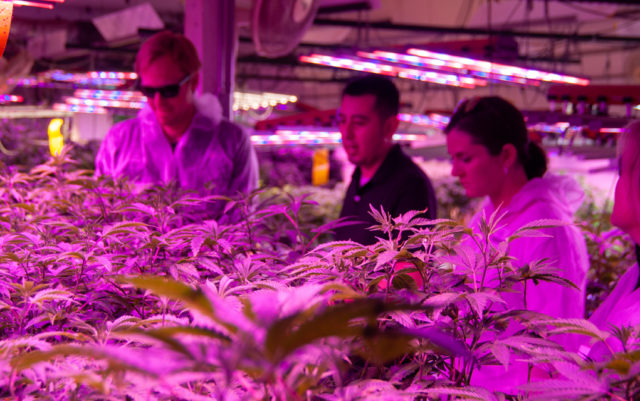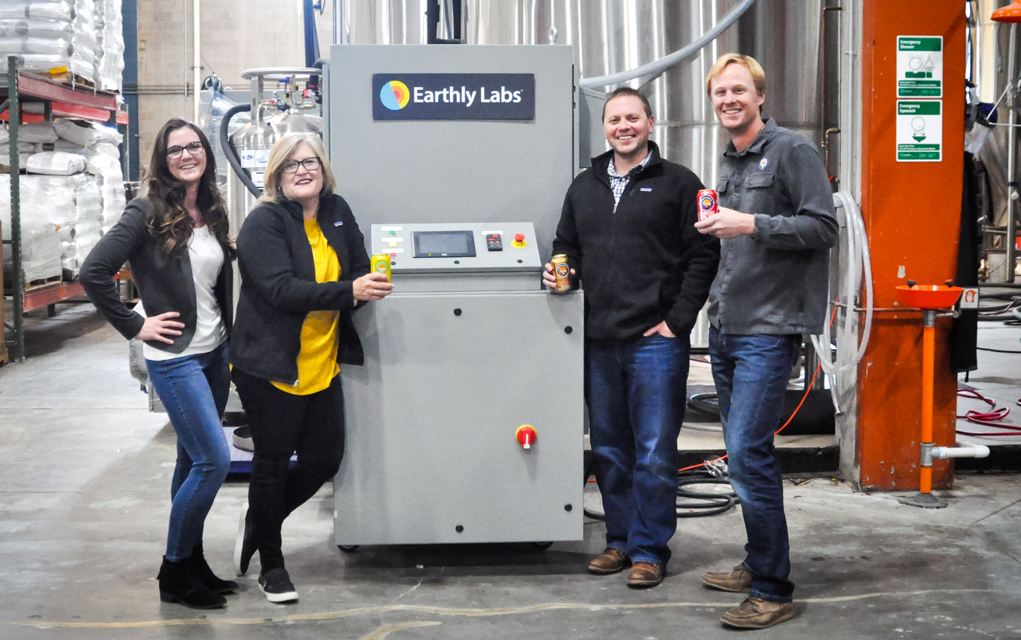
The room is empty except for three large, stainless-steel tanks against one wall, hooked up to wires, hoses and valves. Brian Cusworth, Chris Baca, Gina Cannon and I all stand, arms crossed, watching the tanks pump carbon dioxide through The Clinic’s main grow operation in Englewood.
“CO2 is basically a fertilizer,” says Cusworth, director of operations at The Clinic. “When combined with light it basically gives cannabis plants the energy to grow.”
One of the three tanks was designed by Earthly Labs and filled with CO2 at Denver Beer Company’s Canworks facility in Sunnyside — about seven miles north of the grow operation. (The other two are filled with industrial CO2 from power plants.) The Canworks CO2 is a byproduct of the fermentation process that, up until now, has just been a stream of waste coming out of the brewery. But a unique partnership between The Clinic marijuana dispensaries, Denver Beer Company, Earthly Labs and the Colorado Department of Public Health and Environment (CDPHE) hopes to change that.
“I saw a super exciting opportunity to link these two industries together,” says Kaitlin Urso, the environmental protection specialist at the CDPHE. “A chance to bring a one-way [waste] stream from one and turn it into a commodity for the other.”
Using Earthly Labs’ small-scale carbon capture system, this pilot project eliminates CO2 waste from brewing and turns it into a resource for cannabis growers. The CO2 Earthly Labs provides is cleaner and cheaper than CO2 from industrial providers. It also cuts down on transportation emissions since industrial providers no longer have to transport CO2 around the Front Range.
When Urso pitched Cusworth and The Clinic’s head grower, Chris Baca, the idea of teaming up with Denver Beer and Earthly Labs to increase their efficiency on both financial and environmental levels, they leapt at the opportunity. It seemed to them like a win-win-win situation.
“This is 500 pounds,” says Cusworth, nodding toward the Earthly Labs tank of compressed and liquified CO2. “We get one of these once a week from Denver Beer.”
Baca says The Clinic use 6,600 pounds of CO2 a month, pumping it through a vaporizer and dispersing it throughout the facility — which, Cusworth points out, is about 80,000 pounds a year. Denver Beer Company produces closer to 150,000 pounds of CO2 annually.
“The whole goal is to move everything over to this,” Cusworth says, pointing to the Earthly Labs system.
Next, we follow Baca down the hall, past the helm of his operation: the CO2 control panel where he constantly monitors and adjusts the levels of CO2 circulating through different grow rooms.
Our first stop: the veg room, an LED-lit room, full of baby pot plants.
“This is where it all starts off,” Baca says. I follow him between rows of seedling cannabis plants. He shows me the white tube, which lines the border of the room around the floor and releases CO2 from holes along its length. Baca has strategically placed fans all around to keep CO2 circulating constantly.
“These plants have all spent their entire lives in Denver Beer CO2,” Baca says as he waves his hand over several rows of seedlings.

So far, the plants look healthy. Baca is cataloguing their rates of growth and making sure everything looks good as they grow. He notes, though, that this isn’t really a high-risk experiment for The Clinic. As Urso explains, the CO2 captured off of Denver Beer’s fermentation process is a lot purer than the CO2 that’s produced by combustion at power plants.
How that will affect the flower these plants produce is yet to be seen, however. The plants spend about eight weeks in the veg room, Baca tells me, before they’re taken over to the flower room. From there it’s another eight weeks until he ships them off to a bud dealer.
The plants that have grown up on this CO2 won’t be ready for harvest until late June, and the bud they produce won’t be available until the beginning of July.
But Baca and Cusworth are hopeful. Baca explains that with better-quality CO2, the flower “nugs” that come off his plants will be denser and stickier than those grown with lesser-quality CO2.
Sometime around July 4, customers will be able to get their hands on the world’s first weed grown with beer CO2: a Colorado special. It could very well revolutionize aspects of both the cannabis industry and the craft brewing industry, simultaneously saving local businesses money, reducing breweries’ carbon footprints, and helping to grow sustainable marijuana flower.
“This industry is changing so fast,” Cusworth says. “We’re always trying to see what we can do better and how we can be more sustainable.”














